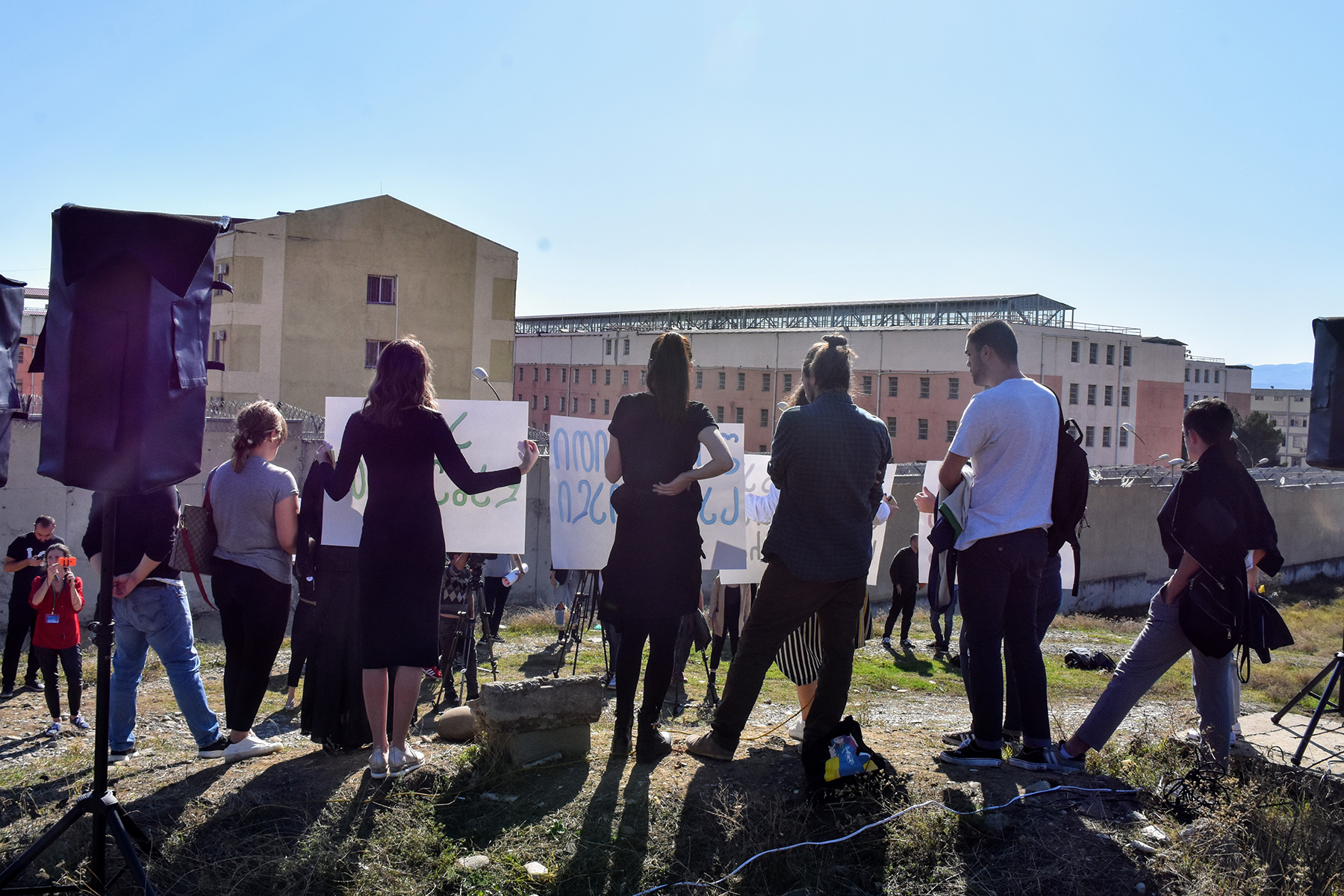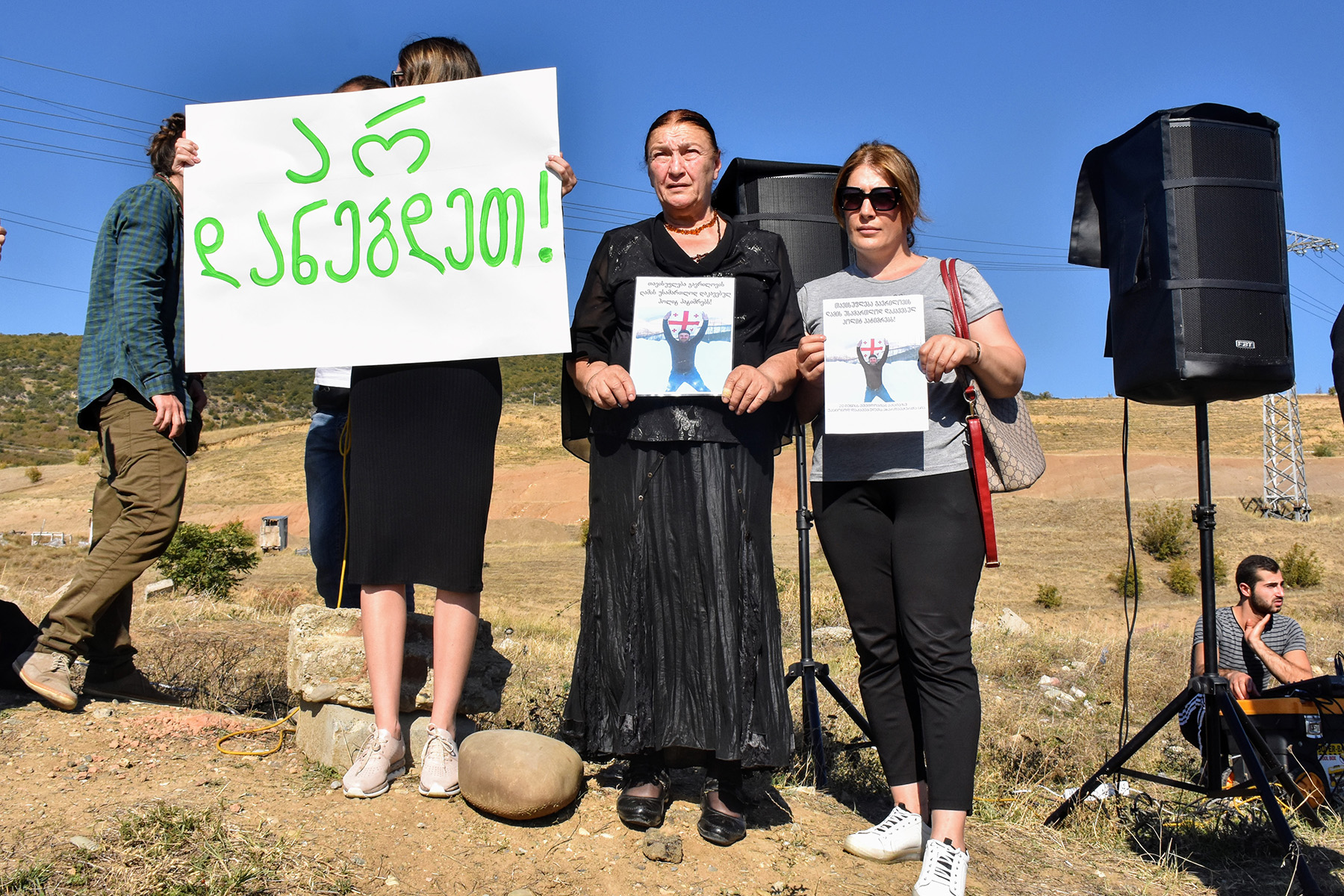
A small group of anti-government protesters gathered outside the 8th Gldani penitentiary facility in Tbilisi earlier today in support of those arrested during 20 June’s protests.
Dubbed ‘Gavrilov’s prisoners’ by activists, 16 people were indicted for ‘group violence’ following 20 June’s protest against the appearance of Russian MP Sergey Gavrilov in the Georgian Parliament earlier that day.
As the protest extended late into the night it descended into violence, with police and protesters battling over the space in front of parliament.
Wednesday’s protest was organised by the youth-led ‘Shame!’ campaign, who have insisted that by dispersing the crowds in June and prosecuting participants, the Georgian government was attempting to appease Russia.
Addressing his son Besik Tamliani at Wednesday’s protest Rusudan Tamliani begged his son to end his hunger strike.
‘Son, a hunger strike would have some effect in a democracy, but in this unjust country, there is no point doing it. Please stop.’

His family said Besik Tamliani had suffered trigeminal neuralgia, sudden and severe facial nerve pains due to being on hunger strike, citing a prison medical examination.
Another of the detainees, Levan Jikuri, who is also on hunger strike, has been partially paralysed and is unable to move independently.
On 27 August, all 16 detainees were denied bail by Tbilisi City Court.
‘Hunger strikes are not the only way to win this war, and we will win this war’, activist Zuka Berdzenishvili stated.
Organisers of the demonstration read out the names of those detained through amplifiers and played several protest songs.
Earlier, the group also launched an online crowdfunding campaign to help the spouse and a child of Levan Jikuri.
‘Political prisoners’
At Wednesday’s demonstration outside Gldani prison, protesters expressed solidarity with detainees and their relatives that stood with a handful of supporters holding posters.
‘There are 16 Gavrilov’s prisoners currently in jail, who we consider political prisoners. Meanwhile, we have information that the riot police officers that dispersed us and aimed for our eyes [with rubber bullets] have been freed’, another activist, Nodar Rukhadze, told OC Media.
One of the three riot police officers detained following 20 June, Levan Imerlishvili, was released on bail on 27 September, which activists denounced as ‘double standards’.
After over three months in custody, the 16 protest participants remain in pre-trial detention charged with ‘organising’ or ‘participating in group violence’, facing 6–9 years in prison.
Nika Melia, an MP from the formerly ruling United National Movement party (UNM) was indicted in July under the same article and was stripped by parliament of his immunity.
Irakli Okruashvili, who recently claimed to be the legitimate owner of disputed TV channel Rustavi 2 and challenged some of the investigations against officials from the UNM, is among the detained.
So far, the Interior Ministry suspended 10 riot police officers over the violence, three of whom have been charged with abuse of power. Two of those officers have since been released on bail.
‘Gavrilov’s Night’
The thousands-strong demonstration on 20 June was triggered by Russian Communist MP Sergey Gavrilov addressing the 26th General Inter-Parliamentary Assembly on Orthodoxy earlier that day from the Georgian Parliamentary Speaker’s podium.
After protests broke out outside and inside the parliament building, Gavrilov was quickly escorted out. But the cancellation of the event and the Russian lawmaker’s departure did not quell the public anger.
As crowds filled Rustaveli Avenue in front of the parliament later at night, some protesters attempted to break through the police line to march into the parliament building.
The violence, including the ensuing dispersal by police, left 280 people hospitalised, including 80 police officers. Two people lost an eye after being hit by rubber bullets.
[Read more in details on OC Media: Thousands clash with police as protesters try to storm Georgian Parliament]
Leaders of the UNM, who threatened at the protest a nation-wide campaign of ‘civil disobedience’ unless the government resigned and called snap elections, were largely absent once the violence erupted.
In response to the protests, Speaker of Parliament Irakli Kobakhidze resigned from his post and the ruling Georgian Dream Party also promised to hold 2020’s elections with a fully proportional system.
However, the party insisted that the clash was an attempt by the opposition to ‘storm parliament’, with some members characterising it as a coup attempt.
Then-Interior Minister Giorgi Gakharia, who despite calls to resign was 80 days later confirmed as Georgia’s new Prime Minister, vowed to punish wrongdoers both among protesters and police officers who used excessive force.
[Read more on OC Media: 5 violations by police during the Tbilisi clash]
According to a poll released by the National Democratic Institute in September, 55% of those surveyed believed the government was responsible for the violence, and 68% said the government used excessive force during the dispersal.
On 4 July, the Chief Prosecutor’s Office announced they were investigating the events of 20 June under Article 315.3 of the Georgian Criminal Code for ‘violent rebellion intended to change the constitutional order or to overthrow or seize the state power, resulting in death or other grave consequences’.
Protesters from the For Freedom group continued to protest daily in front of parliament for three months, demanding then-Interior Minister Giorgi Gakharia’s resignation.




 2 October 2019
2 October 2019


